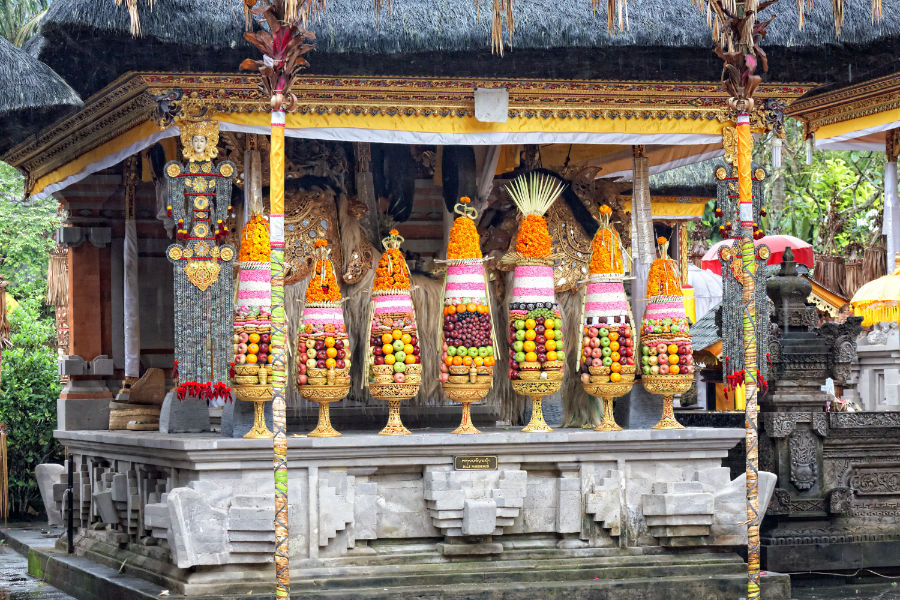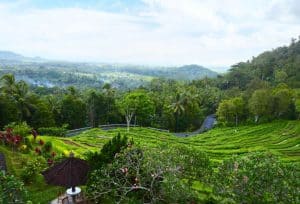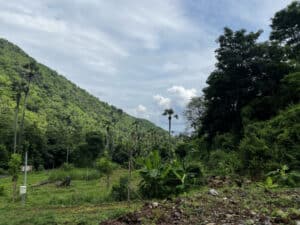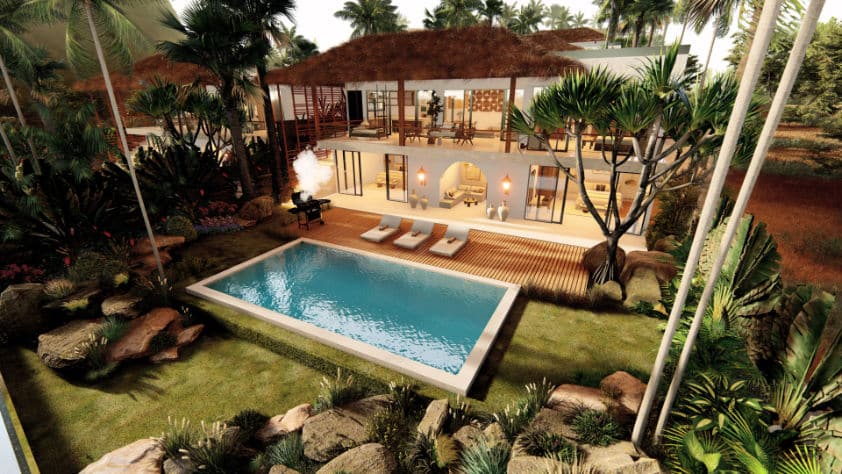Reasons Indian investment in Amed, Bali is proving so popular.
By reading this article, you will learn about;
- Amed’s natural beauty and tranquility make it an attractive location for property investment.
- Why the Indian upperclasses are drawn to Amed due to its serene environment and potential for high-end tourism.
- Why Amed’s future prospects for growth and development are promising, making it an appealing investment opportunity for Indian investment.
Indian investors looking at Amed's real estate potential
In the world of luxury real estate, certain trends have the power to shift the market dynamics in unforeseen ways. One such emerging trend is the increasing interest of Indian Investment in Amed, Bali. This piece is not just a look into the burgeoning property market of Amed but a deep dive into why this picturesque locale is becoming a magnet for Indian investors.
Amed, once a sleepy fishing village on the northeastern coast of Bali, Indonesia, has transformed into a sanctuary for those looking to escape the bustle of city life.
Its dramatic landscapes, featuring the majestic Mount Agung, pristine black sand beaches, and an underwater world teeming with marine life, makes Amed a place of unparalleled natural beauty.
This transformation has not gone unnoticed by the world, especially by those from the Indian subcontinent looking to invest in Amed’s rapidly emerging real estate market.
Amed as a growing tourist destination
The appeal of Amed extends beyond its natural beauty. For one, its growing reputation as a world-class destination for snorkeling and diving attracts tourists and investors alike.
Amed offers a unique blend of tranquility and modern amenities, making it an ideal location for luxury villas and boutique hotels.
The Vesica Villas Celuke development, in particular, stands out as a testament to Amed’s potential, offering state-of-the-art facilities and breathtaking views, tailored to meet the high standards of international investors, particularly those from India.

Why do Indians connect with Amed?
So, why are so many Indians investing in Amed’s property market?
The answer lies in a combination of factors.
Firstly, the desire for international property investment among India’s affluent class has spiked in recent years, driven by the search for lucrative opportunities beyond the saturated markets of Mumbai and Delhi.
Amed, with its burgeoning real estate sector, presents such an opportunity.
Secondly, the cultural affinity between Bali and India, rooted in shared historical and religious ties, makes Amed a culturally comfortable choice for Indian investors.
The presence of Indian restaurants, yoga retreats, and cultural festivals in Amed further strengthens this connection, making Indian investors feel at home.

Exploring Amed, Bali
My husband and I had the chance to visit Amed, Bali last year, and it was truly a hidden gem.
The crystal-clear waters, black sand beaches, and stunning coral reefs made it a paradise for snorkeling and diving enthusiasts like us.
We were amazed by the untouched beauty of this coastal town, and it was easy to see why it’s becoming a sought-after destination.
Finding serenity in Amed’s appeal
During our stay, we met a local fisherman named Ketut, who shared with us the rich culture and peaceful way of life in Amed.
His stories of the traditional salt farming and the warm community left a lasting impression on us.
We understood why Amed’s tranquil environment has become a magnet for those seeking refuge from the hustle and bustle of city life.
Connecting with the Indian community
One evening, we had dinner with a friendly Indian couple, Raj and Priya, who had invested in a small guesthouse in Amed.
They explained how they were drawn to the town’s serene ambiance and saw it as an opportunity for a unique hospitality venture.
Their insight shed light on the increasing interest of Indian investors in Amed’s real estate market.
Embracing the future of Amed
Our experience in Amed made it clear to us that the town’s allure is only set to grow.
With sustainable development and preservation efforts, Amed has the potential to become a prime destination without losing its authentic charm.
Our visit to Amed Lodge by Sudamala Resorts also showcased the thoughtful integration of luxury with the natural surroundings, ensuring a promising future for the town.
Experiencing Amed’s allure
Amed captured our hearts with its tranquility and untouched beauty.
Our encounter with the locals and fellow travelers, as well as witnessing the evolving landscape of the town, made our visit an unforgettable experience.
Amed’s blend of tradition and modernity, along with its natural wonders, truly makes it a captivating destination for travelers and investors alike.
The future of Amed
The future of Amed looks promising, with more high-end developments like Vesica Villas on the horizon.
These developments are not just about luxury living; they are about creating a sustainable and integrated community that respects the local culture and environment.
For Indian investors, this aligns with the growing desire to invest in projects that offer both financial returns and a positive social impact.
Furthermore, the Indonesian government’s recent initiatives to simplify foreign property ownership laws have made it easier for Indian investors to secure a piece of this paradise.
This legislative shift is expected to further fuel the interest of Indian investors in Amed, making it a hotspot for international real estate investment.
Insider tip;
“Keep an eye on legislative changes in the country you’re investing in. The recent changes in Indonesia are a game-changer for foreign investors,” advises a property investment strategist.
The writer was a guest of Amed Lodge by Sudamala Resorts
Experiencing Amed firsthand, staying at the Amed Lodge by Sudamala Resorts, offered a unique perspective on why this town is becoming a preferred destination for India’s upperclasses.
The blend of luxury, culture, and natural beauty, coupled with the warm hospitality of the Balinese people, makes Amed an irresistible choice for those looking to invest in a vacation home or a profitable real estate venture.
In conclusion, Amed’s appeal to Indian investors goes beyond its scenic landscapes and tranquil environment.
It’s about the promise of a luxury lifestyle, cultural affinity, and sustainable investment opportunities that align with the aspirations of India’s affluent class.
As the charming fishing town continues to develop, with projects like Vesica Villas leading the way, Amed is not just selling properties; it’s offering a lifestyle that resonates with the discerning tastes of Indian investors.
The future of Amed, Bali, looks bright, and for India’s real estate investors, it’s an investment opportunity like no other.
For those interested in exploring the Vesica Villas development or other investment opportunities in Amed, Bali, understanding the market, cultural dynamics, and legal considerations is crucial.
With the right approach, investing in Amed can be a rewarding venture that offers both financial benefits and a chance to own a piece of paradise.
- Researching and selecting a property.
- Negotiating terms and price.
- Conducting due diligence to check property legality and encumbrances.
- Signing a sales and purchase agreement (Akta Jual Beli) or lease agreement.
- Transferring payment.
- Updating the property title under the new ownership or leaseholder’s name.
The process and timeframe for buying land in Bali can vary depending on a number of factors, such as the location, the type of land, the ownership structure, and the specific regulations and requirements involved. Once you have found the land you want the land transfer process takes about a month.
- Inspection and due diligence (2 weeks)Contracts (1 week)Money transfer (1 week) Timeframes can vary for many reasons, but the above timeline is a fair representation.
The costs of buying a villa and leasing land in Bali can vary depending on factors such as the location, size, and condition of the property, as well as the terms of the lease and the fees charged by agents and lawyers. Generally speaking, you can expect to pay the following costs:
- Purchase price of the villa: Initial capital outlay for your villa.Leasehold fees: This includes the cost of the lease, which can vary depending on the location and size of the land, as well as any renewal fees and taxes. A typical leasehold fee is around 10-15% of the purchase price per year.Legal fees: You will likely need to hire a lawyer to assist with due diligence, drafting contracts, and registering the property, which can cost around 1-2% of the purchase price.
- The first step in setting up a PT.PMA business is to determine your business activities and the type of company structure you require. This will involve choosing a business name and identifying the shareholders, directors, and commissioners of the company.
- Obtain a Tax Identification Number (NPWP). To obtain a Tax Identification Number (NPWP) for your company, you will need to register with the tax authorities in Indonesia. This will involve submitting a range of documents, including your business plan, company registration documents, and other supporting materials.
- Secure your Business License and Company Registration.
- Once you have your NPWP, you will need to secure a business license and register your company with the relevant authorities in Bali. This will involve submitting a range of documents, including your articles of association, shareholder agreements, and other supporting materials.
- Setup a business bank account in Indonesia and deposit the minimum paid-up capital.
- Obtain other necessary permits and licenses.
Depending on the nature of your business activities, you may need to obtain other permits and licenses from various government agencies in Bali. These may include licenses related to construction, environmental impact, or other regulatory requirements.
The approximate costs of setting up a PT.PMA business in Bali can vary widely depending on a range of factors such as the nature of your business activities, the size of your company, and the complexity of the regulatory requirements. A simple company setup is approximately $2,500 and takes around two weeks to complete incorporation.
The terms of leasing land in Bali are agreed between the land owner and the individual or party interested in leasing the property. A typical lease will last from 25-30 years, however, some leases are as short as 20 years, while others can be longer than 40 years. The figures refer to the initial lease.
The lease contract will normally permit the leaseholder to extend the lease for a similar period to the initial lease, however, the price will reflect the updated market value of the land at the time of the renewal.
Foreigners are allowed to own villas and land in Bali through a leasehold or a Right-to-Use (Hak Pakai) agreement, as owning land in Indonesia is restricted to Indonesian citizens and Indonesian legal entities.
A leasehold agreement grants the foreigner the right to use the land and villa for a certain period of time, typically up to 25 years, with an option to renew the leasehold agreement. A Right-to-Use agreement grants the foreigner the right to use the land and villa for up to 80 years, which is a longer term than a leasehold agreement.
- PT.PMA – Foreign-owned investment companyNPWP – Tax Identification NumberIMB -IMB (Izin Mendirikan Bangunan) is a building permit.Pondok Wisata – License to rent your villa out to tourists.Notaris – An official responsible for drafting and authenticating lease & legal agreementsBPHTB – Land and Building Acquisition TaxHak Malik – FreeholdGreen zone – Cannot build onYellow zone – legal to build on.Hak Pakai – LeaseholdAre – Unit of measure predominantly used in Indonesia. 1 are = 100sqm’sIDR – Currency used in Bali. 15,250 IDR = $1
When buying a villa and leasing land in Bali, there are several taxes and fees that you may need to pay, including:
- Value-Added Tax (VAT): This is a tax imposed on the sale of new properties and is typically around 10% of the purchase price. However, if the seller is not a taxpayer or does not have a VAT ID number, the tax rate is increased to 20%.Land and Building Acquisition Tax (BPHTB): This is a tax on the transfer of ownership of land and buildings and is typically calculated based on the sales price or the assessed value of the property, whichever is higher. The tax rate varies depending on the location and value of the property but can range from 1% to 5%.Notary and Land Deed Fees: You will need to pay fees to the notary for drafting and registering the land deed, which is typically around 1% of the sales price.Legal Fees: You will need to hire a lawyer to assist with due diligence, drafting contracts, and register the property, which can cost around 1-2% of the purchase price.Rental Income Tax: If you plan to rent out the villa, you will need to pay income tax on the rental income. The tax rate varies depending on your residency status and can range from 5% to 30%. It is important to note that taxes and fees can change over time, and the above information is accurate as of 2023. We recommend consulting with a qualified tax advisor or lawyer to get up-to-date information on tax implications when buying a villa and leasing land. Please Contact Us for more information on this subject
The return of investment is around 7 years. This is a conservative estimate based on the current real estate market in Amed. However as land and property prices are on the increase, buying a villa in Amed before prices explode gives you the best chance to generate outsized returns on your investment.
Our property management services cover everything from maintenance to rental bookings. We offer a complete villa management solution along with monthly reporting and tax accounting assistance.
For a luxury, 3-bed pool villa, investors can buy a home in Amed for around USD$249,000. The cost of buying a villa in Amed is considerably cheaper than a like-for-like property in Seminyak, Sanur or Canggu.
The real estate market in Amed is entering the early stages of a property boom. Land and property prices are currently low compared to the more established areas in the Southern part of Bali. Property investors are looking to profit from low prices in Amed as they anticipate significant land and property value appreciation.








